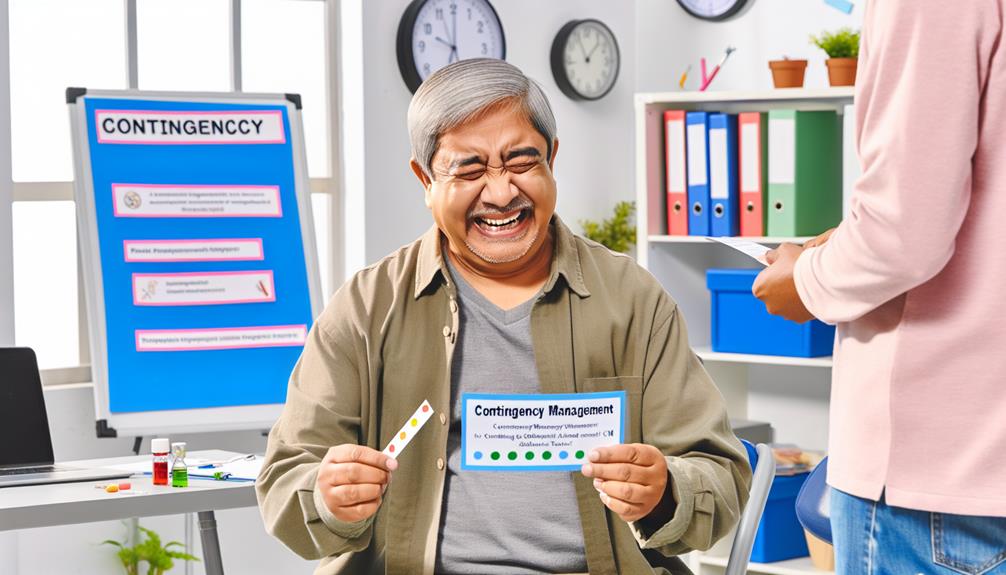When it comes to treating substance abuse, you need the best of the best. Lucky for you, we've got the inside scoop on the 6 absolute, cannot-be-missed, evidence-based therapies that will blow your mind.
These therapies have been carefully researched and proven to be highly effective in helping individuals overcome their addiction.
But we won't keep you waiting any longer – let's dive right in and explore these game-changing treatments that are revolutionizing the field of substance abuse treatment.
Cognitive Behavioral Therapy (CBT)

Cognitive Behavioral Therapy (CBT) is a highly effective and widely used treatment approach that aims to address the connection between thoughts, feelings, and behaviors. CBT focuses on cognitive restructuring, which involves identifying negative or irrational thoughts and replacing them with more positive and realistic ones.
By challenging and changing these negative thoughts, individuals can modify their behaviors and improve their overall well-being.
In CBT, behavior modification techniques are also employed to help individuals develop healthier habits and eliminate harmful behaviors. This involves setting specific goals and creating a plan to achieve them. For example, if substance abuse is the problem, a person undergoing CBT might work on identifying triggers and developing coping strategies to prevent relapse.
One of the key principles of CBT is the idea that thoughts, emotions, and behaviors are interconnected. By altering thoughts and behaviors, individuals can achieve positive changes in their emotions and overall mental health.
CBT provides individuals with practical tools and techniques that they can use in their everyday lives to manage their thoughts, feelings, and behaviors more effectively.
Motivational Interviewing (MI)
Motivational Interviewing (MI) is a collaborative and person-centered therapy approach that aims to elicit and strengthen an individual's intrinsic motivation to change problematic behaviors. MI techniques are designed to help individuals explore and resolve their ambivalence towards change, by emphasizing empathy, understanding, and support.
Here are five key aspects of MI that contribute to its effectiveness:
- Empathy: MI therapists strive to understand and empathize with the individual's perspective, creating a safe and non-judgmental environment.
- Rolling with Resistance: Rather than confronting or challenging resistance, MI therapists avoid power struggles and instead adopt a more accepting and validating approach, allowing individuals to explore their concerns and reservations.
- Developing Discrepancy: MI aims to help individuals recognize the discrepancy between their current behaviors and their desired goals, highlighting the need for change.
- Supporting Self-Efficacy: MI therapists actively support and reinforce an individual's belief in their ability to change, promoting self-confidence and empowerment.
- Enhancing Intrinsic Motivation: MI techniques encourage individuals to identify their personal reasons for change, tapping into their intrinsic motivation and increasing their commitment to making positive changes.
The effectiveness of MI has been demonstrated in various studies, showing positive outcomes in reducing substance abuse, increasing treatment engagement, and promoting long-term recovery. With its collaborative and person-centered approach, MI provides a valuable therapeutic tool in the treatment of substance abuse.
Contingency Management (CM)

As we shift our focus to the next therapy approach, let's explore Contingency Management (CM), a highly effective method that complements the collaborative and person-centered nature of Motivational Interviewing (MI).
Contingency Management is an evidence-based therapy approach that uses positive reinforcement to promote behavior change in individuals struggling with substance abuse. It's based on the principle that behavior is influenced by its consequences. CM offers tangible rewards, such as vouchers or privileges, for meeting treatment goals, such as attending therapy sessions or providing drug-free urine samples.
Research has shown the effectiveness of Contingency Management in reducing substance use and increasing treatment retention. Studies have found that CM interventions lead to higher rates of abstinence, longer periods of sobriety, and decreased drug-related problems. The use of positive reinforcement has been particularly effective in motivating individuals to engage in treatment and maintain abstinence.
However, despite its proven effectiveness, the implementation of CM can present challenges. One challenge is the availability of resources to provide the tangible rewards. Funding and logistical issues can limit the extent to which CM can be implemented in treatment settings. Additionally, some clinicians may have reservations about using rewards as a means of behavior change, raising ethical concerns.
Despite these challenges, Contingency Management remains a valuable and effective therapy approach for substance abuse treatment. Its focus on positive reinforcement and collaboration makes it a powerful tool in helping individuals overcome addiction and achieve lasting recovery.
Dialectical Behavior Therapy (DBT)
Dialectical Behavior Therapy (DBT) provides individuals struggling with substance abuse a comprehensive and evidence-based approach to address emotional regulation and interpersonal skills. DBT techniques, rooted in cognitive-behavioral therapy, have been shown to be effective in helping individuals overcome substance abuse and manage other mental health challenges.
Here are five key points about DBT effectiveness:
- DBT emphasizes the importance of mindfulness, teaching individuals to focus on the present moment and develop awareness of their thoughts, emotions, and sensations.
- DBT incorporates skills training, where individuals learn specific techniques to regulate emotions, tolerate distress, improve interpersonal effectiveness, and enhance mindfulness.
- DBT utilizes a dialectical approach, recognizing the need to balance acceptance and change in order to promote lasting recovery.
- DBT employs individual therapy sessions to help individuals apply the skills learned in treatment to real-life situations.
- DBT often includes group therapy sessions, providing a supportive environment where individuals can learn from others and practice their newly acquired skills.
Research has shown that DBT is effective in reducing substance abuse, improving emotional regulation, and enhancing overall well-being. By equipping individuals with the necessary skills to address their substance abuse and underlying emotional challenges, DBT offers a promising path towards recovery and long-term success.
Medication-Assisted Treatment (MAT)

Now let's explore the next treatment approach, Medication-Assisted Treatment (MAT), which offers individuals struggling with substance abuse a different approach to their recovery journey.
MAT is a comprehensive treatment approach that combines medication with counseling and behavioral therapies to address substance abuse.
One of the key benefits of MAT is its efficacy in reducing cravings. Medications such as methadone, buprenorphine, and naltrexone are commonly used in MAT to help individuals manage withdrawal symptoms and cravings associated with opioid and alcohol use disorders. These medications work by targeting the brain's reward system and reducing the pleasurable effects of substances, making it easier for individuals to abstain from drug or alcohol use.
Research has shown that MAT can have positive long-term outcomes in substance abuse treatment. Studies have found that individuals who receive MAT are more likely to remain in treatment, reduce illicit drug use, and experience fewer relapses compared to those who don't receive medication.
MAT has also been associated with a decrease in criminal activity and improved social functioning. Additionally, MAT has been found to reduce the risk of infectious diseases, such as HIV and hepatitis, by promoting safer injection practices and reducing drug-related behaviors.
Family Therapy
Family therapy is an essential component of substance abuse treatment. By involving the family in therapy, you can benefit from their support and understanding throughout your recovery journey.
Additionally, family therapy can help improve communication skills and heal any dysfunctional dynamics within the family unit.
Benefits of Family Involvement
By actively involving family members in the treatment process, individuals struggling with substance abuse can experience improved outcomes and increased support.
Family involvement in substance abuse treatment has been shown to have numerous benefits, including:
- Enhanced family support: When family members are involved in the treatment, they can provide emotional support and encouragement, which can significantly impact the individual's recovery journey.
- Increased accountability: Family involvement can help hold the individual accountable for their actions and choices, reducing the likelihood of relapse.
- Improved communication: Family therapy can improve communication patterns within the family, helping to address underlying issues that may contribute to substance abuse.
- Strengthened relationships: Through therapy, family members can rebuild trust and strengthen their relationships with the individual in recovery.
- Long-term relapse prevention: Involving the family in treatment can enhance the individual's relapse prevention strategies by providing a strong support system and helping them develop healthy coping mechanisms.
Enhancing Communication Skills
After experiencing the benefits of family involvement in substance abuse treatment, it's essential to focus on enhancing communication skills through family therapy.
Improving interpersonal relationships and developing effective conflict resolution strategies are crucial aspects of successful recovery.
Family therapy provides a safe and supportive environment where family members can learn how to communicate effectively with one another.
By improving communication skills, individuals and their families can express their needs, concerns, and emotions in a healthy and constructive manner. This helps to foster understanding, empathy, and trust within the family unit, which are essential for long-term recovery.
Family therapy also teaches techniques for resolving conflicts in a respectful and productive way, reducing the likelihood of relapse and promoting overall family well-being.
Through enhanced communication skills, families can strengthen their relationships and provide a solid foundation for ongoing support and healing.
Healing Family Dynamics
Healing family dynamics through family therapy involves addressing underlying issues and fostering positive change within the familial unit. Family therapy can be a powerful tool in healing trauma and rebuilding trust within the family.
Here are five important aspects of family therapy that contribute to the healing process:
- Creating a Safe Space: Family therapy provides a safe environment where family members can express their thoughts, emotions, and experiences without judgment.
- Identifying and Addressing Trauma: Family therapy helps uncover and heal past traumas that may be impacting the family dynamics.
- Improving Communication: Therapists help families develop effective communication skills, enabling them to express their needs and concerns openly and honestly.
- Promoting Healthy Boundaries: Family therapy assists in establishing healthy boundaries within the family, promoting respect and understanding among family members.
- Building Trust: Through guided discussions and exercises, family therapy helps rebuild trust within the family, allowing for more meaningful and authentic connections.
Family therapy can be a transformative experience, leading to improved relationships and overall family well-being.

